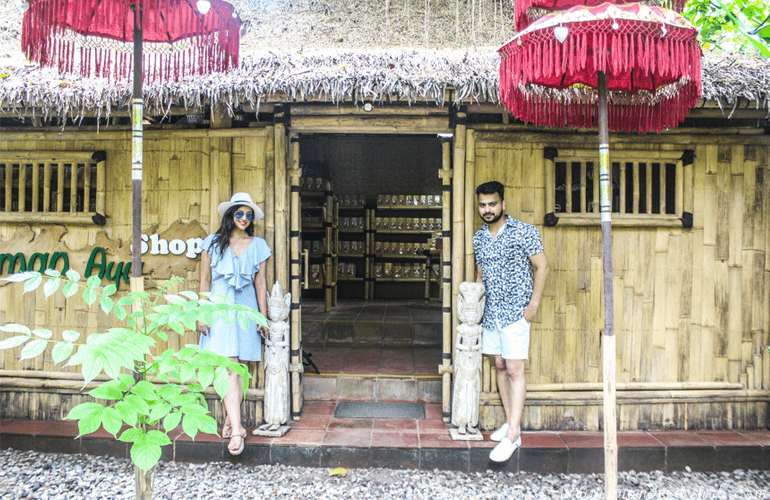
Traveling is like a drug! The more you travel, the more you become addicted to satisfy your inner wanderlust. What we learnt while traveling to so many places is that knowledge is limitless. Things we are addicted to can also be the things we know the least about. Doesn’t it sound ironical? It is indeed.
If you follow us on Instagram, you must have an idea by now that we both are big-time coffee lovers. From the French press to the drip method; we love coffee just as much as the way it is made. So what would you expect from such big coffee lovers when they get to visit Bali – an island famous for coffee production?
Yes, you got me right! We decided to find out more about coffee production. And for the same visited a coffee plantation farm called ‘Taman Ayu’ in Bali. It served varieties of coffee out of which the most intriguing was the Kopi Luwak coffee.

Happy to visit this green farm house before getting the reality check
Kopi Luwak coffee was the one to capture most of our attention because of the fact that it was made out of civet cat’s poop! The thing we usually feel disgusted about at even the mention of it, is used to make our favourite – hot and searing coffee.
The so called aristocratic and playful animal – ‘The cat’ eats Cherries (also known as the coffee fruit). It then secretes the indigestible parts of the fruit that is used to make the most expensive coffee in the world – LUWAK. The coffee beans are extracted and then sent for cleaning, milling and roasting. Now it is even available in India!
A start-up company – Coorg Consolidated Commodities (CCC) has bought the idea of producing Civet coffee in the state of Karnataka and sells this coffee under the name “Animane”. But what makes them different from the one produced in Taman Ayu is, that it completely follows natural process and doesn’t cage the cats. Now this is intriguing but I still don’t buy the concept as yet!

Dragon fruits galore
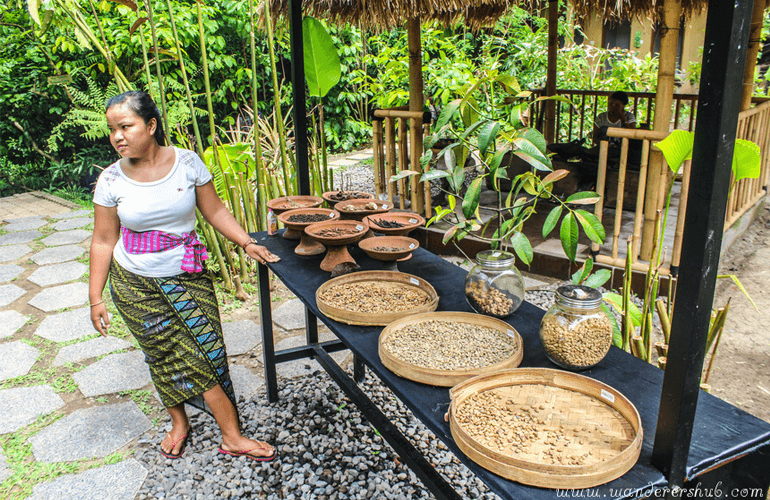
Coffee beans all around
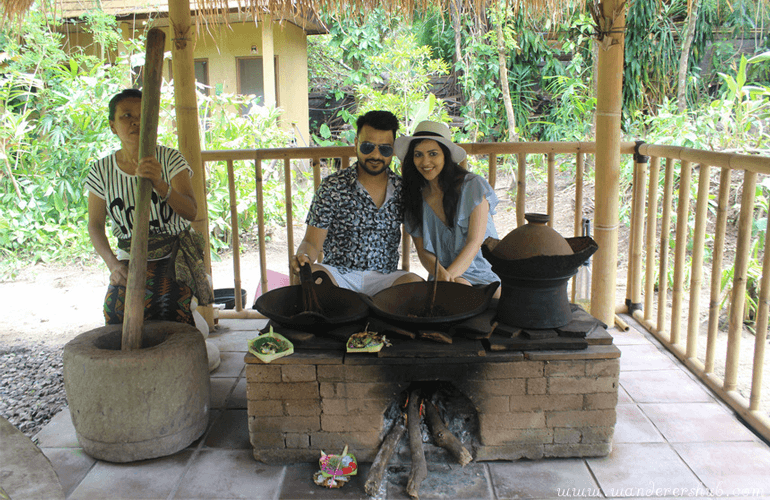
Till this point we weren’t aware of the conditions civet cats are subjected to
These coffee gardens in Bali are fragrant, surrounded by lush green lawns and scenic beauties. A delight for young and old alike! But what is hidden behind these farms with nature’s abundance is the torture Civet Cats have to face while the processing of the coffee.
As I said, we tried different types of coffee but we didn’t even think of trying the Cat Poop Coffee Bali – reason being the brutality and inhuman behavior faced by the innocent animals. The Civets are coerced to live inside the cages in loneliness. They have no access to the things that make them happy.

We did enjoy our visit to Taman Ayu but were saddened to see the civet cats
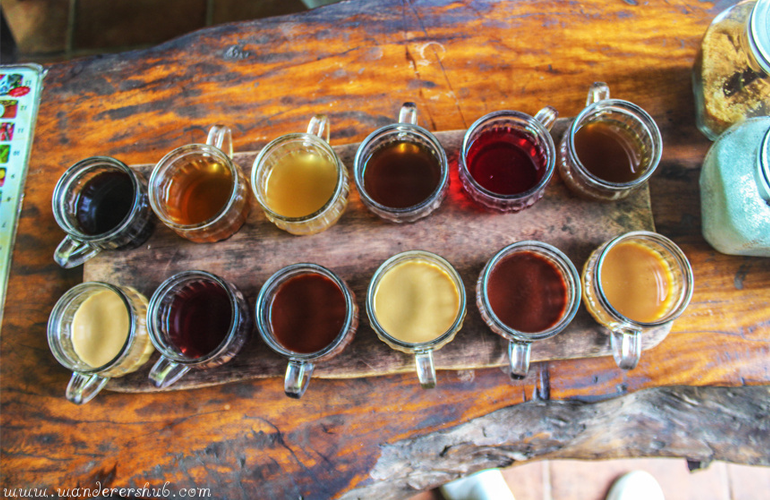
Different types of teas you can try for free
The glorified picture of these coffee farms hides the cruelty, the helpless cats have to face. The topic is still debatable. Many owners at the coffee plantation farms in Bali claim that they keep Luwak in an open environment. That those babies are not subjected to any sort of cruelty. But what we saw with our own eyes is unquestionable.
As travelers, we aren’t any experts on this subject but we have the right to QUESTION. Based on our observations, we did not find it ethical to taste that SHIT!!!!
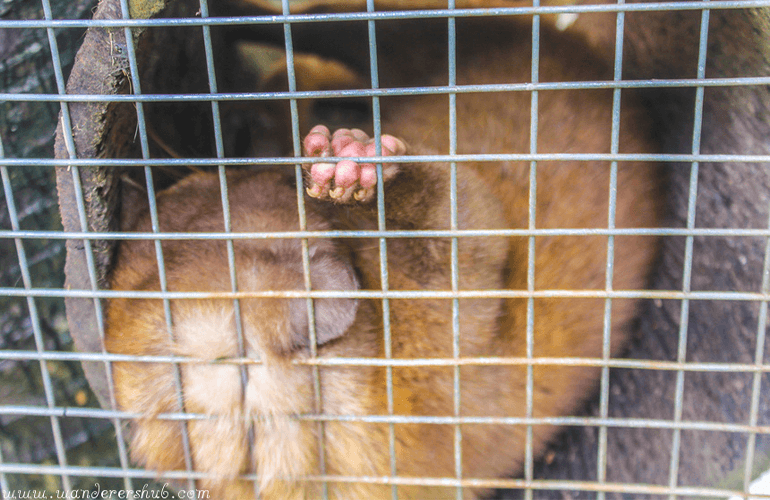
Civet cat caged and kept hungry in there for long hours

Now you know why you mustn’t try cat poop coffee Bali
So yes, we did enjoy our visit to Taman Ayu and savored every sip of the coffee we ordered (not the luwak coffee) but have no plans of visiting again. My love for coffee is way too less than my respect and affection for the animals.
There are a lot of social issues that unfold everyday but this one is not very popular or perhaps significant for the welfare workers. So, since every drop makes the ocean we went against the barbaric behavior of a few by not trying the Luwak coffee and deciding of never being to that place again.
However, if we ever learn that the cruelty has ceased to exist, we won’t mind being the brand ambassadors for endorsing wide variety of coffee. After all, “Once a coffee lover is always a coffee lover.”
*****
I had a similar experience too. Enjoyed a tour of one of these coffee estates in Bali but had no idea of what goes on behind the scene! Thankfully, I mostly prefer tea to coffee 🙂
We visited Bali and had heard before of the conditions of these animals so we didn’t visit. However something interested me about your conclusion about the animals being worth more than your need for coffee. I’m not here to judge, but I wonder if you are vegetarian or not and if this experience might make you consider that. People often ask me why I am and why vegetarians eat fake meat products etc. My response is usually along the same lines. I can’t lie, the taste of meat is nice, addictive some believe, but I consider my desire for that to be less important than the life of an animal. So those fake meats kind of cover that, just like I guess other less expensive coffee would fulfil that need. Just a thought.
That’s kind of horrifying! I’m so glad you wrote honestly about what you saw there… it’s not worth it to make expensive coffee if you’re hurting animals. I think some of these practices originated long ago but there’s just no reason for them now.
I honestly don’t know how is this is still allowed to happen. Those poor animals. We were kinda forced into visiting one of these places but I refused to drink the coffee – not only is it super expensive but I was totally repulsed by the entire set up. Yuck.
Whenever some animal product is highly sought after, unscrupulous people will exploit the animals. They care about their bank balance, not kindness to others.
Thanks for raising awareness of the cruelty and suffering involved in producing this famous coffee. It sounds gross to start with, now even worse.
I have heard of this coffee but I never knew it involved such animal cruelty. Poor things! I’m glad you are writing about it so more people traveling to Bali will be aware.
I have visited Bali thrice on work and pleasure and been directed here as something that I must not miss. I concur with your views as the living conditions are appalling. Not a fan of any caged bird/animal. And looking at the hospitality of the Balinese people and their relationship with nature, this offering totally surprises me
Thank you for your write up about the conditions of these Civet Cats. We cannot as travelers allow these things to go unnoticed or untalked about. Thank you for exposing future travelers to Bali about this issue!
Thanks Lacey. We were repulsed by the entire setup and glad that we didn’t taste that ‘poop’ literally. Hope government can do something about it.